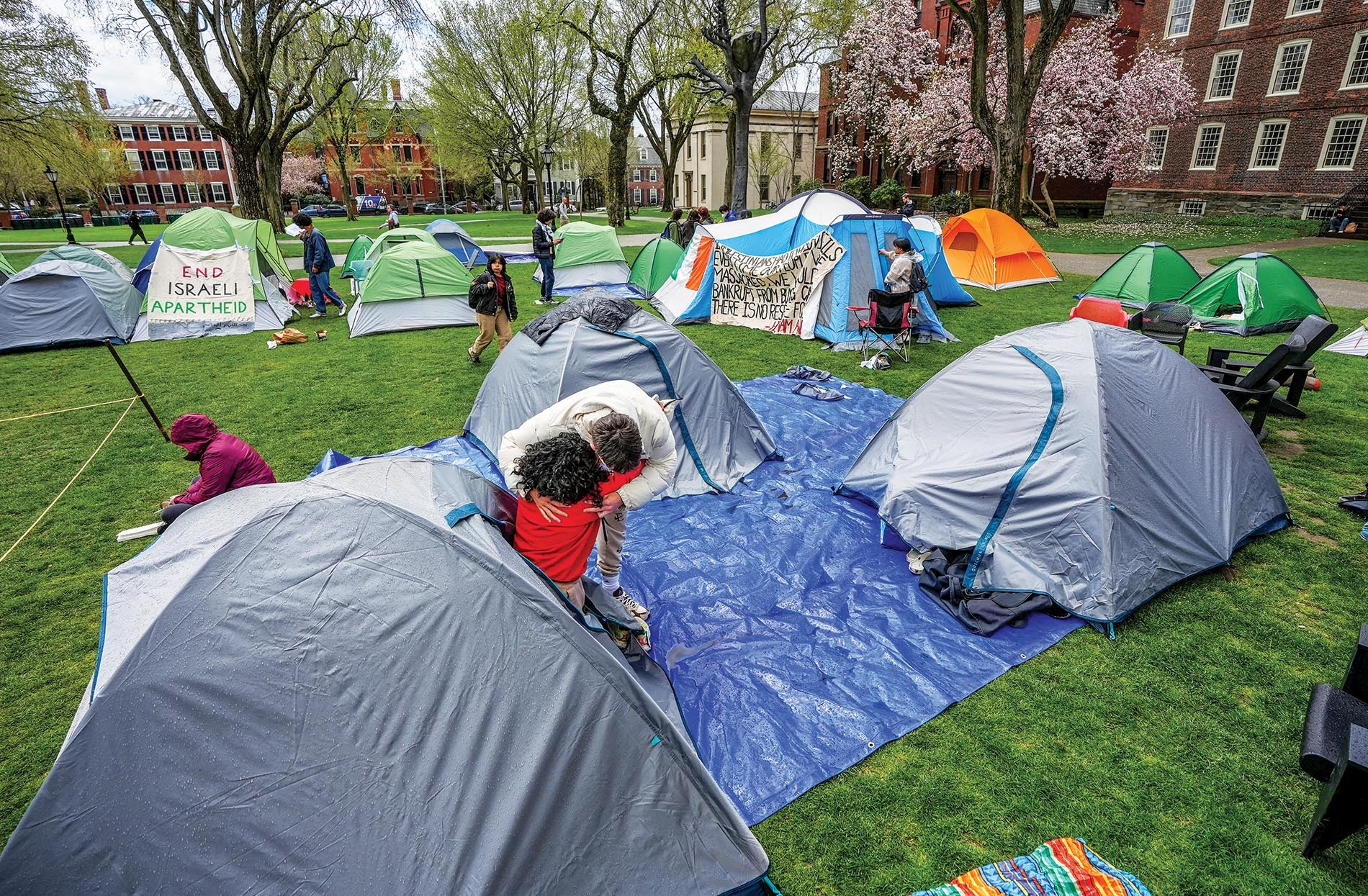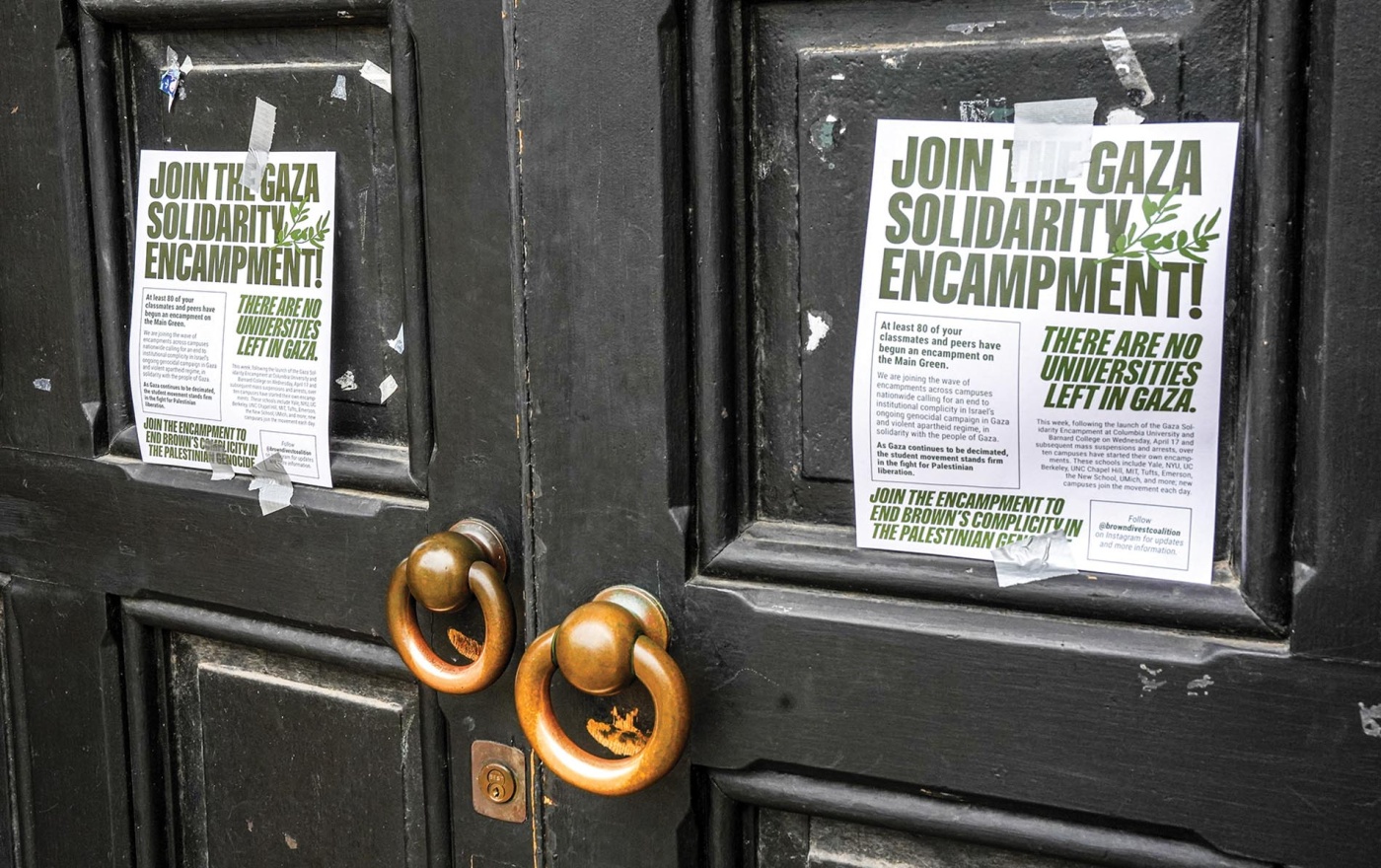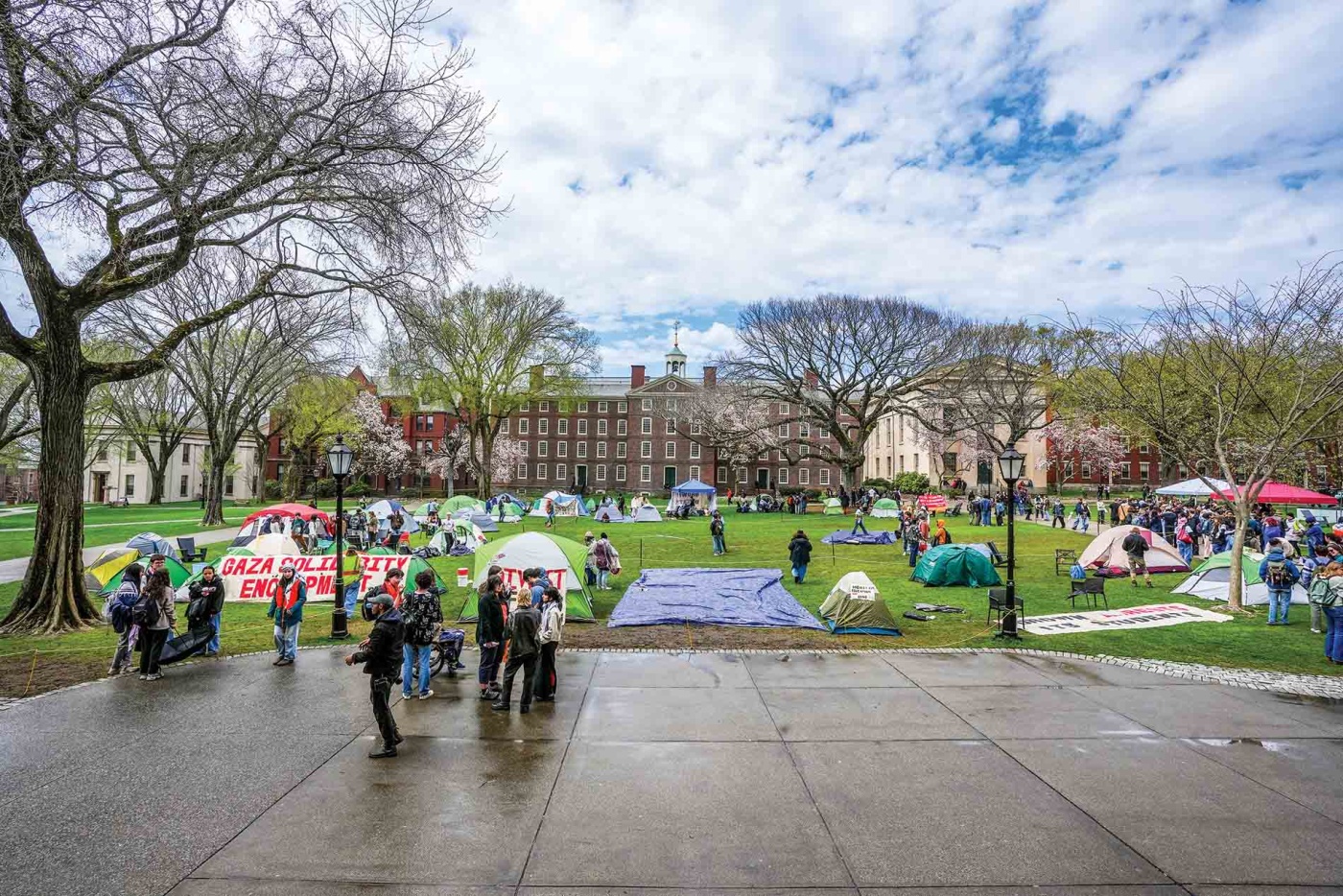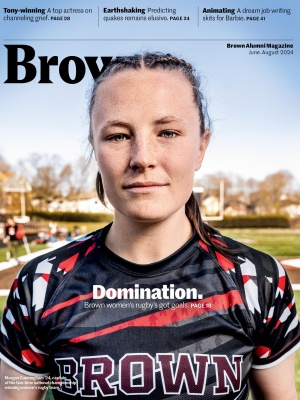
“Built to Hold Disagreement”
Balancing student safety and freedom of speech
A “Gaza solidarity encampment” that formed on the Main Green April 24 ended when student protesters packed up voluntarily on April 30 when President Christina H. Paxson committed to arrange a meeting between five students and members of the Brown Corporation at its May meeting as well as to bring a vote on divesting from “the Israeli occupation of Palestinian territory” to the Corporation this fall.
The 90-plus protesters—formally known as the Brown Divest Coalition and made up of several groups, including Jews for Ceasefire Now and Students for Justice in Palestine—had also demanded that the 41 students arrested during an earlier sit-in have their charges dismissed. Paxson refused, saying that she respected protesters’ “conviction and passion,” but that getting arrested was an “informed choice” and part of the practice of civil disobedience. Encampment participants will likewise face disciplinary action, though their voluntary dispersal “will be considered a favorable mitigating factor.” Any bias, harassment, or discrimination will be investigated.
“Brown has always prided itself on resolving differences through dialogue, debate, and listening to each other,” said Paxson, who sent a letter April 29 that opened negotiations. “Even with this agreement, there remain many differences within our community about the Israeli-Palestinian conflict. But, as I have emphasized before, universities were built to hold disagreement and grapple with competing views. This is an essential part of our mission of advancing knowledge and understanding.”
Brown’s encampment was planned within hours of the arrests of over 100 pro-Palestinian student protesters at Columbia University, when student organizers at Brown met over Zoom to discuss how they could show their support. Aboud, a junior who asked that only his first name be used for fear of reprisals, says the answer was obvious: “We needed to replicate it in solidarity.”
At 5:30 a.m. on April 24, less than a week after the arrests at Columbia, Aboud and about 90 other students began setting up tents on the Main Green. Over the next few days, warm spring weather and showers of pink magnolia petals helped create a festive scene, with Palestinian music playing. At times, protesters started a dabke, a form of Palestinian folk dance, kicking their legs and stomping their feet in near unison.
For Aboud, who grew up in Ramallah in Palestine’s West Bank, the protest is deeply personal. “My dad and many people in my family were at different points imprisoned by the Israeli army,” he says. He has childhood memories of Israel Defense Forces raids and having to seek shelter to avoid rubber bullets and tear gas.

After the deal to end the encampment was struck, Paxson said, “I hope the meeting between the students and Corporation members will allow for a full and frank exchange of views.” She added, “I cannot condone the encampment.... Also, I have been concerned about the escalation in inflammatory rhetoric that we have seen recently, and the increase in tensions at campuses across the country. I appreciate the sincere efforts on the part of our students to take steps to prevent further escalation.”
Hunger Strike
Early in February, 19 Brown students began an “indefinite” hunger strike in the campus center, demanding that the Corporation consider divestment from companies that “profit from human rights abuses in Palestine.” The hunger strike lasted eight days and though the strikers were unsuccessful, they garnered national and international attention.
One of the event’s participants, public health grad student Nour Abaherah ’24 MPH, called it an empowering experience. Abaherah is a Palestinian American who has engaged in political action for Palestine since attending protests with her parents when she was as young as five. “It felt like for years we were begging people to care about our issues,” Abaherah says. “Now for the first time, I don’t have to tell people to care.”
New Jewish Journal
On November 7, exactly one month after the Hamas-led attacks on Israel, the Brown Daily Herald published an op-ed titled “An Open Letter from Jewish Students.” The op-ed was clear in its support of the Palestinian people and pushed back against “Zionist institutions” that “purport to be representative of all Jews.”
Theodore Horowitz ’24, an international and public affairs major who identifies as a “liberal Zionist,” says it didn’t sit well with him. “It minimized the fears of antisemitism on campus,” he says, “and made statements that I don’t think many of the other Jewish students would make.” He and some friends submitted their own op-ed titled “An Open Letter in Support of Israel, from Jewish Students and Alumni at Brown University.”
Soon after, Horowitz and a friend started a Jewish newspaper. “We wanted to really showcase Jewish voices,” Horowitz says, “and show the rest of the Brown community what Jewish dialogue is really like.”
The first issue of the Brown Jewish Journal—which actively solicits opposing views, Horowitz says—came out March 13 and included work from Jewish visual artists, a personal essay about Yom Kippur, and a restaurant review of a Jewish deli, alongside articles about the rise in antisemitism after the October 7 attack and an opinion piece with the headline “Why do the Jewish People Need a State?”

Politics at Dinner
Early in April, Zoey Fisher ’25 and Asher Radziner ’24 hosted the first of what they hope to be a series of dinners, bringing together Jewish members of the Brown community with a range of political perspectives for a meal and discussion of issues related to Israel and Palestine.
Fisher, who is Jewish and has family in Israel, says she felt disheartened by the atmosphere on campus. “Every aspect of campus life was being taken over by very public aggression,” Fisher says. “All these separate groups were having their own protests and events, but no one was actually coming together and talking about it.”
Radziner, Fisher’s co-host, had been hosting a dinner series for some time called In Progress. “Those dinners were not centered on the topic of Israel and Palestine,” Radziner says. “They were for people who are developing an idea or working on something that they’re passionate about.”
The pair created a short form and shared it among different Jewish groups on campus. They were overwhelmed by the response. “People were saying, ‘I miss my friends,’” Fisher says. “It’s been so polarized that we haven’t been together.”
Twelve students attended the first dinner. “Everyone got really into it and went really deep and vulnerable,” Fisher says. “It was a healing tool because you realize that there are events in a person’s life that influence their views and it’s not something you can discount. It’s just something you can learn from.”





